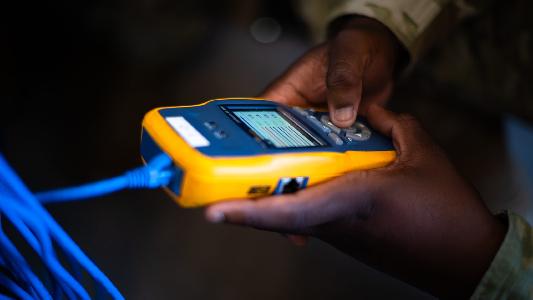Thanks to a new collaboration, George Washington University (GWU) pupils and faculty now have access to a federal program for STEM worker cultivation.
The DC-based private university and the National Institute of Standards and Technology (NIST) recently partnered to have GWU participate in NIST’s Professional Research Experience Program (PREP). The program, which began in 1991, partners with universities to provide lab experience and financial support to undergraduates, graduate students, postdoctoral candidates and faculty, as well as further develop the United States’ STEM workforce.
The GWU-PREP partnership also brings $29.9 million in federal funds to create research opportunities at NIST’s Gaithersburg, Maryland campus and support students in financial need through stipends, wages, travel expenses and more.
The Southeastern Universities Research Association, a DC-based consortium of North American universities that aims to promote collaborative scientific advancement, is also working on PREP with GWU.
David Broniatowski, an associate professor in engineering management and systems engineering at GWU, serves as GWU-PREP’s principal investigator and program coordinator. He said that the program offers a potential pipeline throughout an individual’s academic and professional career.
“The PREP program, in principle, could follow [a] person all the way through from undergrad to masters to Ph.D., to being a full-time faculty member at a university,” said Broniatowski. “And that person can continue collaborating with NIST throughout that program, so it’s really set up to incentivize people to stay in the research ecosystem — and to enhance our national labs and our competitiveness.”
“This is, essentially, a two-way platform in which the professional growth of those who are working at GW also [involves] a career plan or professional plan,” added electrical and computer engineering professor Can Korman, who manages GWU-PREP. “And this also serves their own professional growth, along with helping NIST and its mission.”
Broniatowski said PREP works like rolling admissions. NIST will make announcements when there’s an open position in a lab, to which GWU will identify students or faculty who would be the best fit. NIST will receive that information from GWU and make its selection. If the institute chooses a student from the university, GWU-PREP will set them up with a faculty mentor and create a career development plan.
According to Broniatowski, the ideal candidates for PREP are those looking to work in the STEM field long-term so that once they gain extensive experience, they can potentially mentor others. Another ideal candidate would also be a researcher who does not have access to a national lab.
“For example, you might have faculty, or you might have Ph.D. students that may not necessarily have known about NIST, or may not have had the opportunity to interact with NIST or with people in the national labs,” Broniatowski said. “We simply try to facilitate introductions. We try to get people in a room together to talk about cool research ideas because our hope is that we’ll come up with projects that are ultimately aligned with NIST’s mission, which is to serve the American people by enhancing trust in metrology.”
GWU-PREP also aims to diversify the STEM workforce by targeting researchers from underrepresented groups. GWU’s proposal to join PREP included communications, outreach and inclusion plans to meet specific goals. In fact, Broniatowski said that a unique aspect of GWU-PREP is that an external evaluator was brought on to keep them accountable, despite NIST not requiring one. The program is currently looking for an inclusion manager.
Broniatowski also noted that engineering at GWU is overlooked due to the university’s reputation for its law and politics studies. However, the partnership formed between the university and NIST recognizes the capabilities of STEM at GWU, where the technical aspects intersect with law and policy.
“GW, based on our size, we can also be much more flexible and agile,” Korman said. “So these connections that Professor Broniatowski mentioned are helped by the fact that we, an engineering school within GW, can connect with our colleagues in policy and law and so forth, and add or enhance the value we can bring.”
Before you go...
Please consider supporting Technical.ly to keep our independent journalism strong. Unlike most business-focused media outlets, we don’t have a paywall. Instead, we count on your personal and organizational support.
Join our growing Slack community
Join 5,000 tech professionals and entrepreneurs in our community Slack today!

The man charged in the UnitedHealthcare CEO shooting had a ton of tech connections

Northern Virginia defense contractor acquires aerospace startup in $4B deal

From rejection to innovation: How I built a tool to beat AI hiring algorithms at their own game



